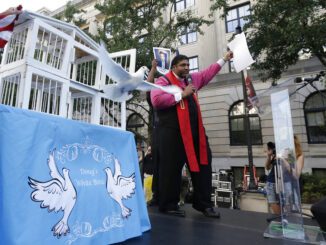RALEIGH — A federal judge issued a temporary restraining order preventing the enforcement of Gov. Roy Cooper’s executive orders that restrict church worship in North Carolina. A group founded by pastors and churches sued Cooper over his executive orders alleging they violate the U.S. and N.C. constitutions.
U.S. District Court Judge James C. Dever heard arguments on Friday from a group of plaintiffs who challenged Cooper’s authority to restrict religious activities. Saturday, the judge said the plaintiffs are “likely to succeed on the merits of their Free Exercise claim concerning the assembly for religious worship provisions in Executive Order 138, that they will suffer irreparable harm absent a temporary restraining order, that the equities tip in their favor, and that a temporary restraining order is in the public interest.”
The judge said unequivocally that “There is no pandemic exception to the Constitution of the United States or the Free Exercise Clause of the First Amendment.”
Restore America staged a rally Thursday in Raleigh that drew hundreds to the Legislative Building where they announced the filing of their lawsuit. The case was quickly heard the following day and less than 48 hours after announcing the suit, Restore America and the pastors who were also plaintiffs could claim an initial victory in the case.
In his ruling, Judge Dever said that the restrictions placed on religious groups “represent precisely the sort of ‘subtle departures from neutrality” that the Free Exercise Clause is designed to prevent.”
Dever also scrutinized Cooper’s statement that inside worship would only be allowed if outside services were “impossible” and that county sheriff’s and local police would enforce the provisions. “A leader of a religious entity or a worshiper, under pain of criminal prosecution for a Class 2 misdemeanor, has to answer to a sheriff or other local law enforcement officer whether it is ”impossible’ to worship outside. Who could answer that question, ‘Yes. It is impossible.’?” asked Dever. “After all, in the overwhelming majority of cases, members of a religious entity would have gathered to worship from somewhere else.”
The judge said there were “glaring inconsistencies between the treatment of religious entities and individuals” and that “the Governor’s counsel conceded that there is no public health rationale for allowing 50 people to gather inside at a funeral, but to limit an indoor religious worship service to no more than 10 people.”
Dever said he did not doubt that Gov. Cooper desired to protect North Carolinians and that it did not ”make a difference that faith-based bigotry did not motivate” the governor’s actions. “The Constitution makes the bar higher than that,” said Dever. “A law is not neutral and generally applicable unless there is neutrality between religion and non-religion.”
The court said the case turns on whether the governor’s orders amount to the “least restrictive means” of accomplishing Cooper’s goals. “They do not,” said Dever.
In granting the temporary restraining order, Dever said losing First Amendment rights “for even minimal periods of time, unquestionably constitutes irreparable injury.”
Dever’s order concludes with advice to worshippers that they “should observe the Recommendations to Promote Social Distancing and Reduce Transmissions to the extent practicable.”



